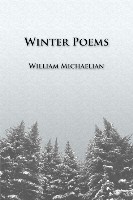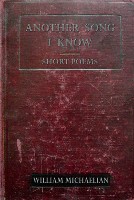Monastery of Psalms (original) (raw)
This poem was supposed to be a story, but it refused. I like when things like that happen. It is partly a remembrance of an imagined past, and partly a snapshot of an imagined present. The people in it are friends I have never met. I think about them often and hope they still remember me. But it�s okay if they don�t. Like the rest of us, they have their own lives to live. The place: Saghmosavank (Monastery of Psalms), in Armenia, and Armenia�s capital, Yerevan. Both are real � which means, of course, that they are the most imagined of all.
Monastery of Psalms
1.
We lived a life behind these walls.
Brothers united by blood and sacred theme,
our mission was to wait and watch and pray
through summer�s dust and winter�s ice and mud,
and through the sweet, sad longing of autumn,
and spring�s blind, erotic dance.
Now, we are gone. But the walls remain,
solemn and gray, bearing the scars
of man�s sad war upon himself.
In crevices, generations of windblown seed
put down roots, then spring forth
like a boy�s new soft beard.
Our voices, also, remain. Or, this is perhaps
imagined, as I imagine I am saying these words
to you now, speaking across ten centuries.
As I imagine you are listening. As you imagine
you are free, when the truth is, you are imprisoned
by your wise cynicism.
2.
The road ends. I stop the car. Above, an eagle flies,
buoyed by our singing, its wings painting whispers
on the empty sky. You push open the door. Already tired,
you climb out, stretch, and gaze up at the walls. I check the
tires and smile to myself. You are bothered by the distance
you must carry your equipment, by the work involved.
As you reach into the trunk, a tiny shower of pebbles
is started by your feet. You do not ask me for help.
While you fumble about, I light a cigarette
and turn toward the walls. I inhale deeply,
then close my eyes and listen: Out of the depths
have I cried unto thee, O Lord; Lord, hear my voice.
You curse under your breath.
Let thine ears be attentive to the voice of my supplication.
You open your tripod and place it on the ground.
You say, �What�s this place called again?�
3.
My sister�s house is busy with people.
She smiles and says, �Where have you been?�
I tell her the same thing I always tell her:
that I have been driving. She kisses me on the cheek.
�For these fat tourists?� she says. �Why do you do it?�
But she knows why. She knows I need the money.
My sister�s children are running through the house.
They come to greet me with their kisses.
The girls smell like flowers,
the boys like warm, black earth.
I give them each a small piece of candy,
then they run away laughing.
The youngest child, a girl,
is just a baby.
She has her mother�s eyes,
and her father�s unruly black hair.
Drowsy, she looks partially melted
on her mother�s hip.
I go outside to find the artist.
My sister�s husband is in his studio.
He is sitting at a small table near the window,
sketching. On the table is a pear.
The pear is so ripe that its color runs out
and forms a golden pool.
The artist looks up. His wordless knowing greets
my memory: water, wind, earth, bread, salt, stone.
The sun�s fire, a deep, volcanic rage, the snow-covered
mountains. A sea of bones. His thoughts rise up like ghosts
and flutter across the room. They settle on my brow,
saying, This is who we are. It is enough.
4.
Today I am alone. After eating breakfast,
I leave the city and drive into the mountains.
Along the road, obsidian shines in the sun like sharp,
broken teeth. Spent grass waits for fire or rain.
Amidst a swirl of autumn leaves, village women offer
the season�s last fruit, bread, and honey.
I keep the window down.
The air is warm and alive with insects.
Here and there, as the road bends,
I can see where I have been.
Behind me, the plateau is a sea of tranquil dust,
the soft color of a pale, dying rose.
I smile and think of home. I think
of my mother and father, teaching school.
I think of my grandparents,
and their white bones lying in the sun.
I remember my childhood, and the games I played
with the other boys in the village.
I remember my sister taking water from the spring,
and watching as the boy who would be her husband
followed her to steal a kiss. I remember writing my first
poem, about moonlight and falling apple blossoms.
Then, I hit a bump in the road, and I think of all the time
I spend driving, and the time I have yet to spend.
5.
I know this place by heart.
Every inch of every wall, every shadow.
The bell tower and dome, alive with birds.
The stone steps leading to the altar,
worn smooth by centuries of silent feet.
The uneven stone floor.
The candle-blackened niches.
The high, narrow windows that have never known glass.
The soft breeze passing through.
The quiet life of spiders.
6.
I live a life behind these walls.
But no one knows. No one.
7.
You take dozens of pictures,
yet your walls remain barren, empty.
Note: Poems, Slightly Used, a growing collection of work first published in my blog, Recently Banned Literature, can be found here.
POETRY COLLECTIONS IN PRINT
Available from Cosmopsis Books of San Francisco Winter Poems
by William Michaelian

ISBN: 978-0-9796599-0-4
US 11.95;∗∗11.95; 11.95;∗∗8.95 at Cosmopsis Books
52 pages. 6x9. Paper.
Includes one drawing.
San Francisco, June 2007
Signed, numbered & illustrated copies Winter Poems displays the skills and abilities of Mr. Michaelian at their most elemental level, at the bone. Wandering amidst a barren world, a world scraped bare, he plucks the full moon like fruit from the winter sky, goes mad and befriends a pack of hungry wolves, burns his poems to keep warm. He is a flake of snow, a frozen old man, a spider spinning winter webs. Spring is only a vague notion of a waiting vineyard, crocuses, and ten-thousand babies. The author is alone, musing, reflecting, at times participating. But not quite alone, for he brings the lucky reader along. I�ve been there, to this winter world, and I plan to go back.
� John Berbrich, Barbaric Yawp
Another Song I Know � Short Poems
by William Michaelian

ISBN: 978-0-9796599-1-1
US 13.95;∗∗13.95; 13.95;∗∗10.95 at Cosmopsis Books
80 pages. 6x9. Paper.
Includes Author�s Note.
San Francisco, June 2007
Signed, numbered & illustrated copies Another Song I Know is a delightful collection of brief, resilient poems. Reading them, one by one by one, is like taking a walk through our common everyday world and suddenly hearing what the poet hears: the leaves, a coffee cup, chairs � and yes, even people, singing their songs of wisdom, sweetness, and light.
� Tom Koontz, Barnwood poetry magazine